Living Through the Beirut Explosion
Living Through the Beirut Explosion
It was just after 6pm and, after working from my apartment in Beirut all day due to Covid 19, I was lying on my bed chatting to friends on WhatsApp, when suddenly a low rumbling noise filled the air and the ground started to shake. My brain leapt into action and jumped to the nearest point of reference I had – an earthquake! So I stood up from the bed and started walking towards the door, where I’d left my shoes, thinking that I should exit the building in case it collapsed. As the ground continued to shake, a load of muddled thoughts flashed through my mind – maybe Israel was bombing Beirut again, like my local friends had told me about in 2006, when they never knew whether family members would return from walking to the shops. Or maybe it was a terrorist bombing.
There was a sudden wave of noise, like a tsunami crashing against the building, as the large glass windows of my little studio apartment came crashing into the room. I didn’t see it, as I was looking the other way, but I felt and heard it. Then, in an instant, it was over. I turned calmly around to face the bed and what was left of the windows. It all happened too quickly to react with panic. There I saw the large glass pane from the window above the balcony doors shattered across the bed where I’d been lying seconds earlier, the light above the bed ripped from its mountings, and the heavy curtains, rail and all, lying on the floor.
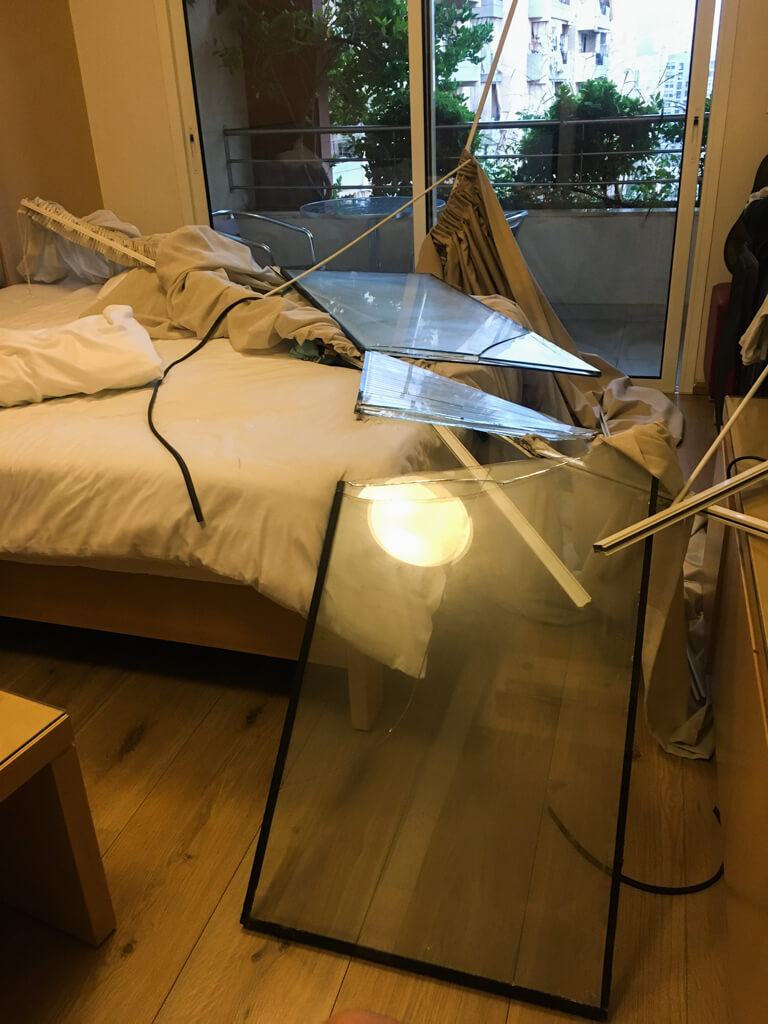
The remains of my window lying across the bed where I’d been lying seconds earlier.
Then my heart sped up and I knew that, to blow in the windows, it must be an explosion. Being unsure of the stability of the building, I continued to grab my shoes and head out of my apartment. The ceramic door frames around the lift doors were lying shattered on the floor (but anyway, I would take the stairs) and some of the ceiling panels had fallen into the hallway floor, leaving bear light bulbs hanging from their sockets. I walked quickly down the stairs seven floors to the lobby and out into the street. A panic-stricken Lebanese woman came running over and asked to use my phone to call her husband. I gave it to her and helped her dial the number, as she was shaking too badly, but the network was jammed, probably by the volume of people trying to call their loved-ones.
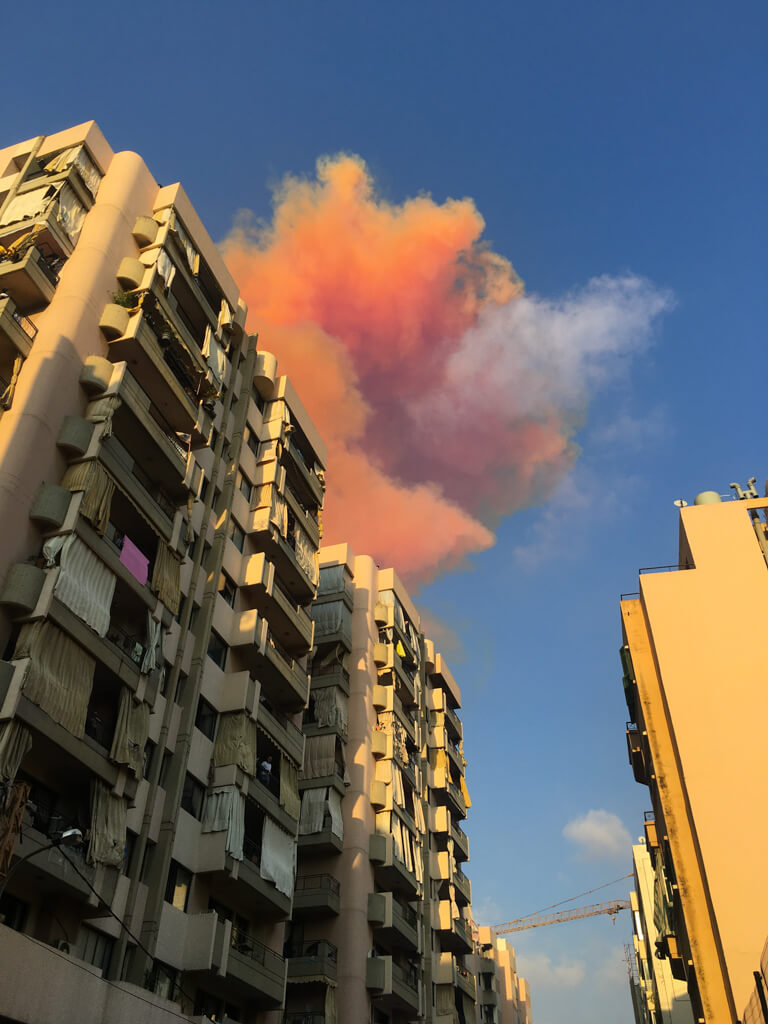
Red smoke billowing into the afternoon sky over Beirut.
Looking towards the city centre, a huge plume of red smoke billowed up from between the high-rise buildings and across the sky. I struck up a conversation with a Lebanese guy, who was calmer than the lady, and we speculated that Israel was once again bombing Beirut and, incorrectly, that there must be multiple explosions, as the smoke was coming from an area that was not in-line with the building’s windows and so column’t have blown them in. Little did we know at that point that the explosion had been so powerful that being in direct line or not hardly mattered – we were 2km away from the epicenter of the explosion, the other side of a hill, and still it shattered our windows.
Eventually, the news started to come through on what had happened. Videos of the explosion appeared on WhatsApp within about ten minutes, followed speculation and ‘official’ announcements that a warehouse of fireworks had exploded (no one believes official announcements in Lebanon anyway). Within an hour even the BBC and CNN had their first breaking headlines, although with no further information as to what had actually happened.
I stayed outside for about an hour and, once it seemed that the danger had passed, headed back to my apartment. A feeling of shock started to set in, so I busied myself first with cooking some food and, after eating, with cleaning up the apartment as best I could, moving the broken glass and twisted curtain rails out onto the balcony. It was then that I realised just how heavy the glass was. If I had still been lying where I’d been on the bed, it may have hit my feet and would almost certainly have broken them. And if it had come down onto the head of the bed instead of the foot, well, I didn’t want to think about what that would have meant.
After the incident, I had a complete blank in my memory of the time between getting up from the bed and looking around to see the smashed window lying across it. I didn’t see the moment that the windows blew in, because my back was to them. But it was only while writing this article that I managed to recollect the feeling of the power of the implosion behind me and the deafening roar of the shattering glass. It was like nothing that I have experienced before.
The next morning we had the day off work to recover and I couldn’t resist going out to see the aftermath with my own eyes. I walked from my house to the districts of Gemmayzeh and Mar Mikhael, adjacent to the port area where the explosion took place. The streets of my own district of Achrafieh were strewn with broken glass, much of which had fallen from apartment blocks above. I passed by the ABC Mall, my local shopping centre, to find that the entire glass facade at the front, which rose four stories above the street, had shattered. As I headed down towards the coast, the destruction became progressively worse, with many buildings having lost all their windows and in some cases the metal window frames as well.
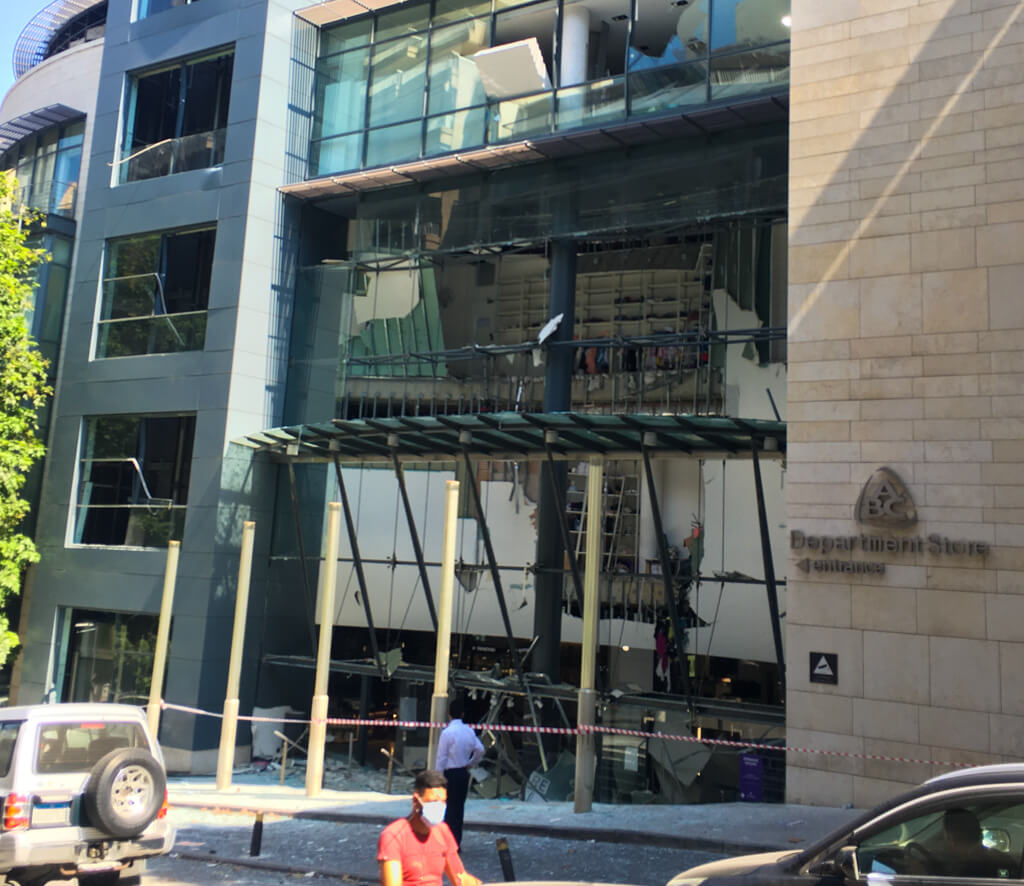
The facade of the ABC Mall Achrafieh, Beirut.
When I finally arrived in Beirut’s main nightlife street in Gemmayzeh, where I often went to party in the evenings, I hardly recognised it. Every bar and restaurant on the street had had its windows blown in, glass was everywhere, balconies and, in some cases entire buildings, had collapsed. The front of the building that housed Electric Bingsut, a cocktail bar I used to frequent, had caved in so that I didn’t even recognise it at first. In some cases, entire cars were buried under the rubble of fallen buildings.
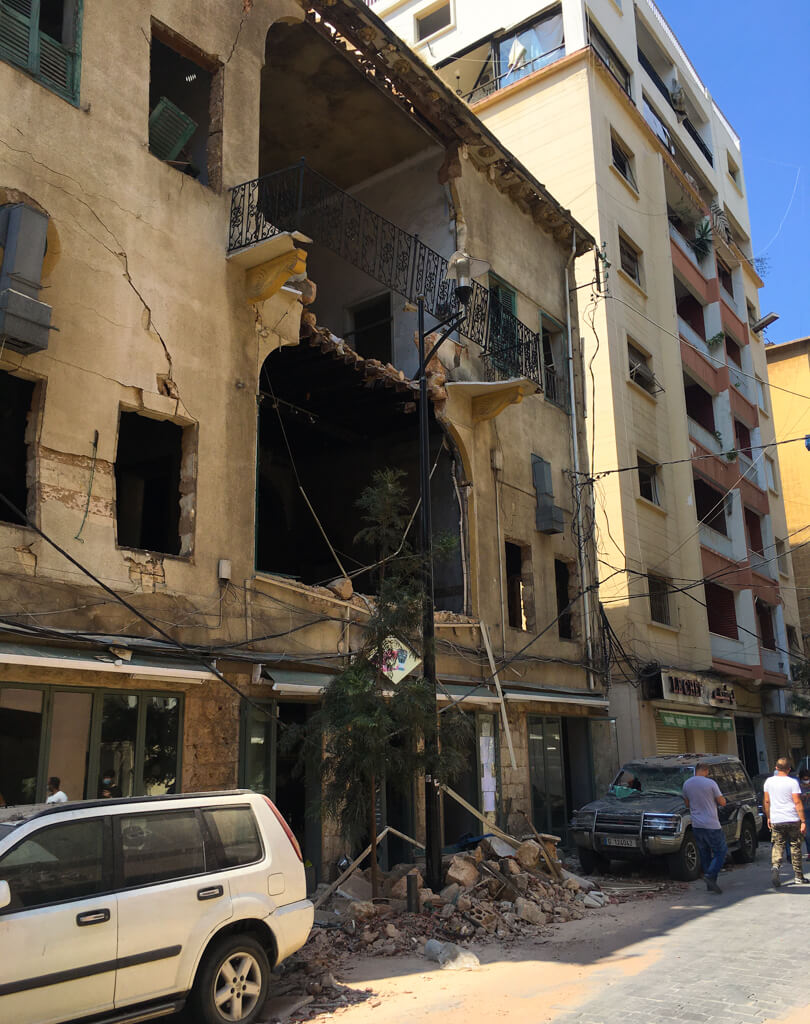
The remains of the Electric Bingsut cocktail bar.
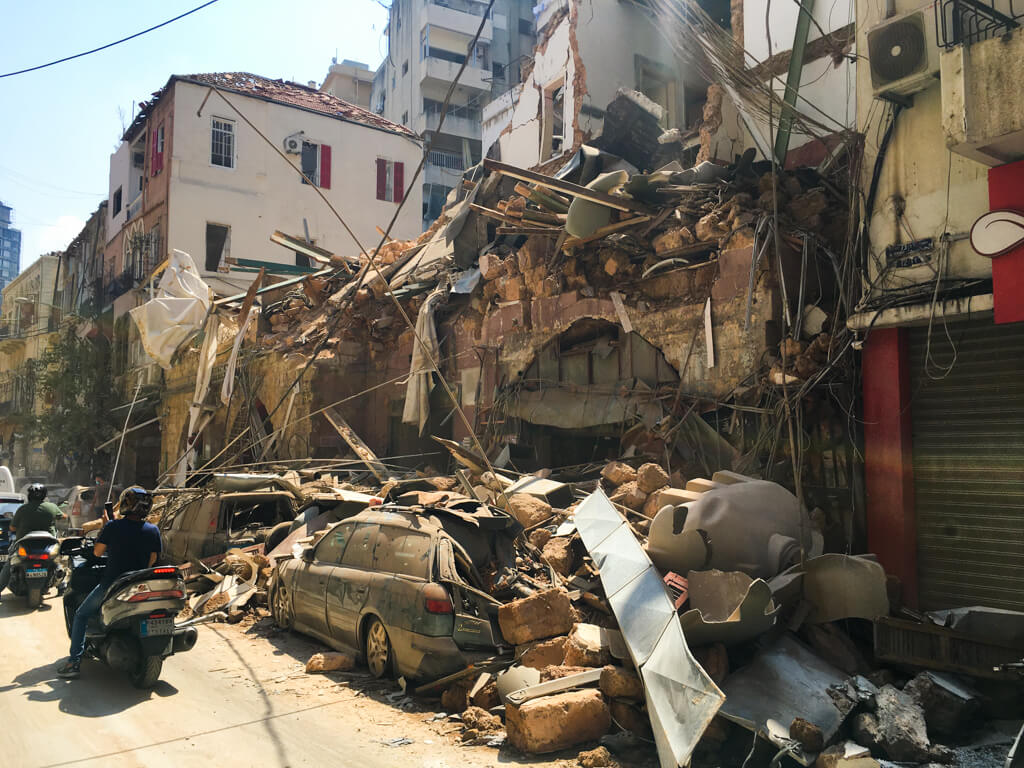
Some of the older buildings had almost totally collapsed due to the power of the explosion.
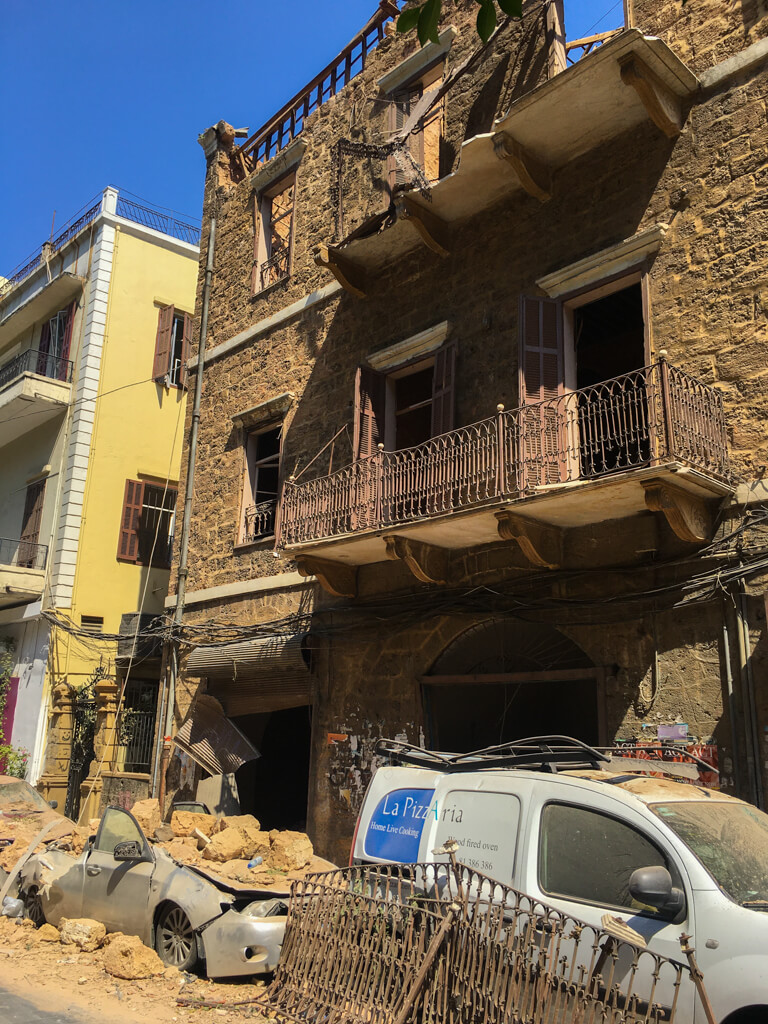 Some balconies had collapsed into the street below. [/caption]
Some balconies had collapsed into the street below. [/caption]
I wandered around and took some photos, but didn’t stay too long. Many local people were in an obvious state of shock and it felt a bit like voyeurism. I saw the remains of Lebanon’s main grain silos, amazing still standing next to the site of the explosion, and the 140m wide crater where the 2750 tonnes of ammonium nitrate that exploded had been located, that had become a new bay as the Medditeranean sea had rushed in to fill it. I also saw the huge EDL (Lebanon’s state-run electric company) offices without a single window remaining. Maybe no great loss – rumour was that it was so badly run that staff had been raising chickens inside the building to sell on the side.
The following Saturday, my employer organised an event to help cleanup the worst-affected areas. Over a hundred people took part and I went with some colleagues and their friends to the Gemmayzeh area, broom in hand. When we arrived, I was amazed at the solidarity the Lebanonese people showed to those whose homes and businesses had been damaged or destroyed. There were literally thousands of volunteers wielding brooms, shovels and gloves helping out those in need. Others gave out free bottles of water and some prepared sandwiches in makeshift food kitchens. All wore masks for protection from the dust and from the escalating Covid 19 pandemic. To start with, it was actually difficult to find people to help, as, four days after the incident, a lot of cleanup work had already been completed.
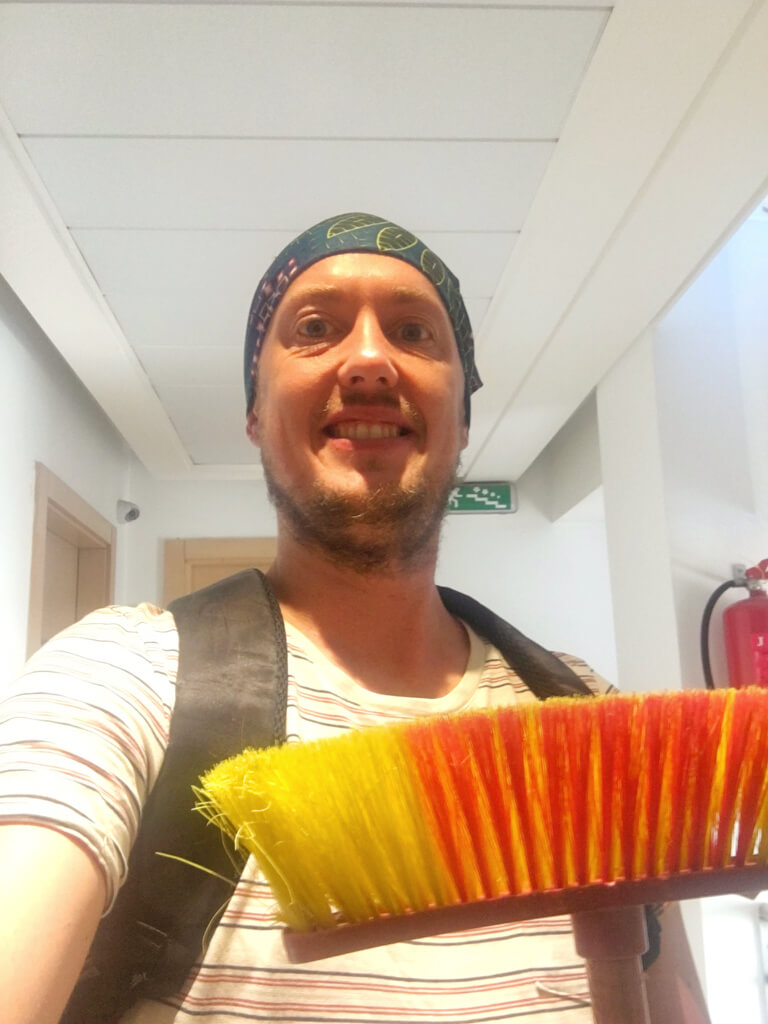
I borrowed a broom and heavy-duty gloves from my landlord and headed out to help with the cleanup.
We walked into several apartment buildings (the ones that didn’t look like they might collapse) and asked if anyone needed help. In one building, we formed a human chain with other volunteers to pass debris and bits of broken furniture down the stairs. Then, in another, a local man called Eddy asked us to come to a penthouse apartment on the tenth floor. He warned us that the house was full of precious books and that his mentor, who owns the apartment but lives in France, had asked him to take care of them. “Nothing else matters except the books,” he explained.
When we entered the apartment, being careful to avoid the gaping tenth floor lift shaft next to the door, we were greeted by a scene of devastation. There were books everywhere – every single area of wall space was covered in bookshelves and many of the books had fallen to the floor. Fortunately, with the exception of one large one in the living, most of the books shelves were still attached to the walls. We spent the next two hours with a team of volunteers tidying the books and replacing them on the shelves, sweeping broken glass from the floor, repairing the broken bookshelves and trying to open the apartment’s second door, which had jammed shut as the building shifted.
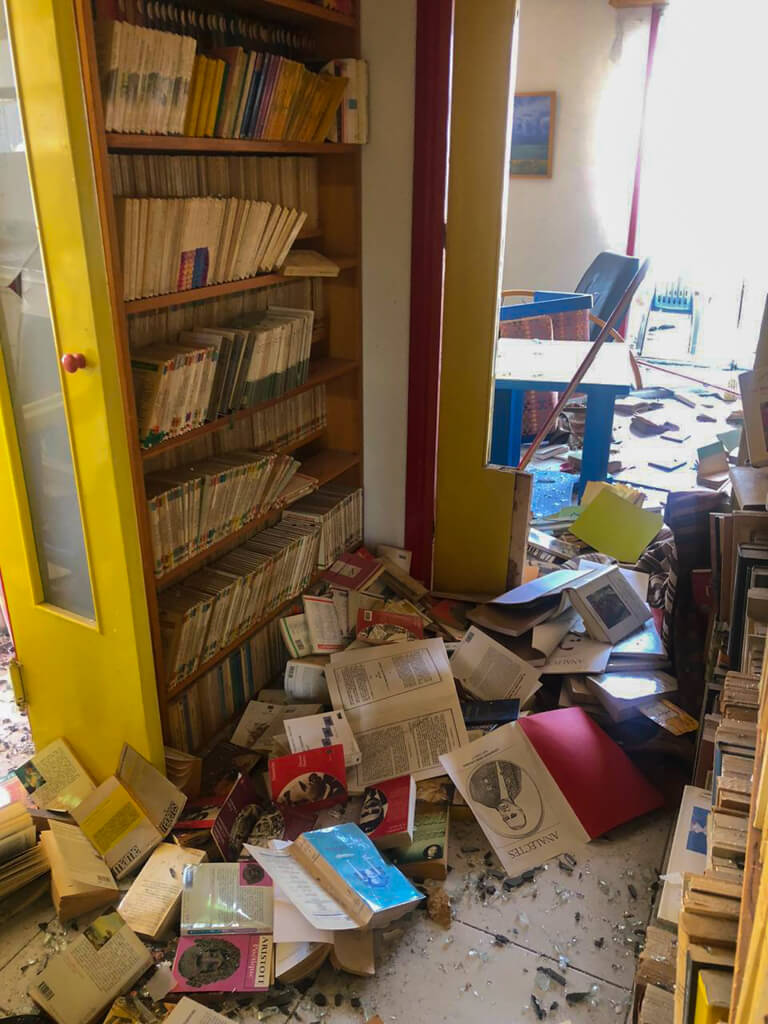
The scene when we entered the apartment.
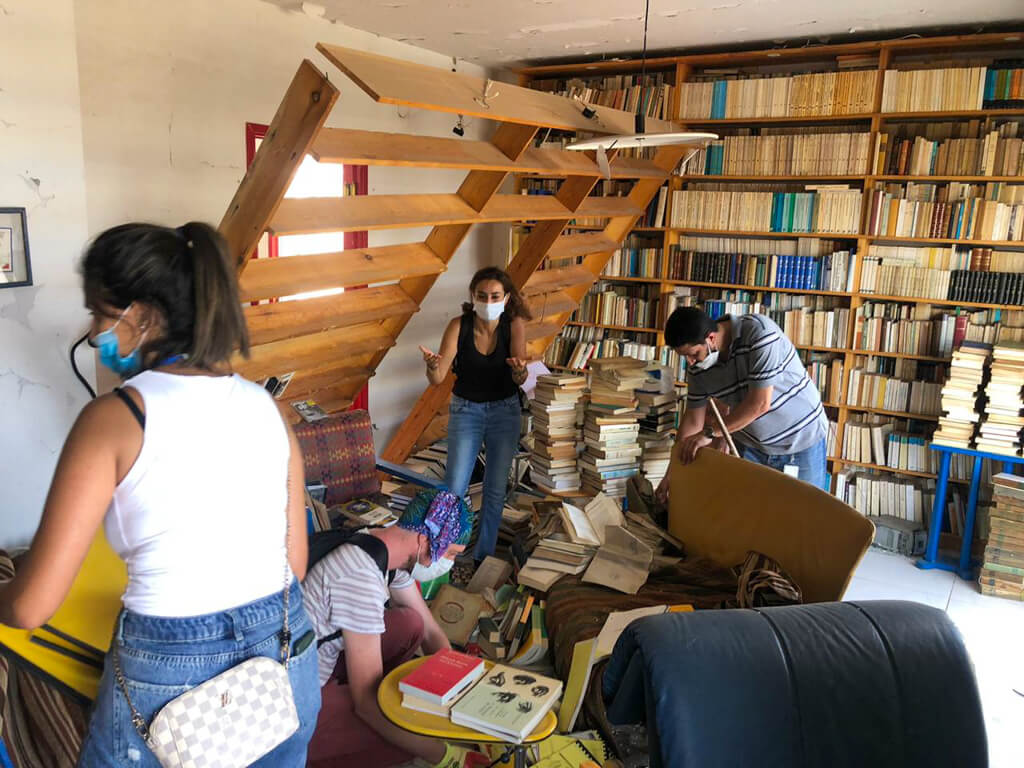
Cleanup in progress!
We were very happy to find someone who needed our help and Eddy was very grateful. Once we were finished, we went out on the balcony, being careful to avoid areas that had fallen away, presumably due to the explosion, and it was easy to see why the apartment had been so badly affected. The view was incredible. Between a few other buildings, there was an unobstructed view of the Mediterranean sea – directly over where the port warehouses had been. Being in direct line-of-sight with the explosion, the apartment must have taken the full force of the blast. Before we left, Eddy took a photo of us and thanked us for our help.
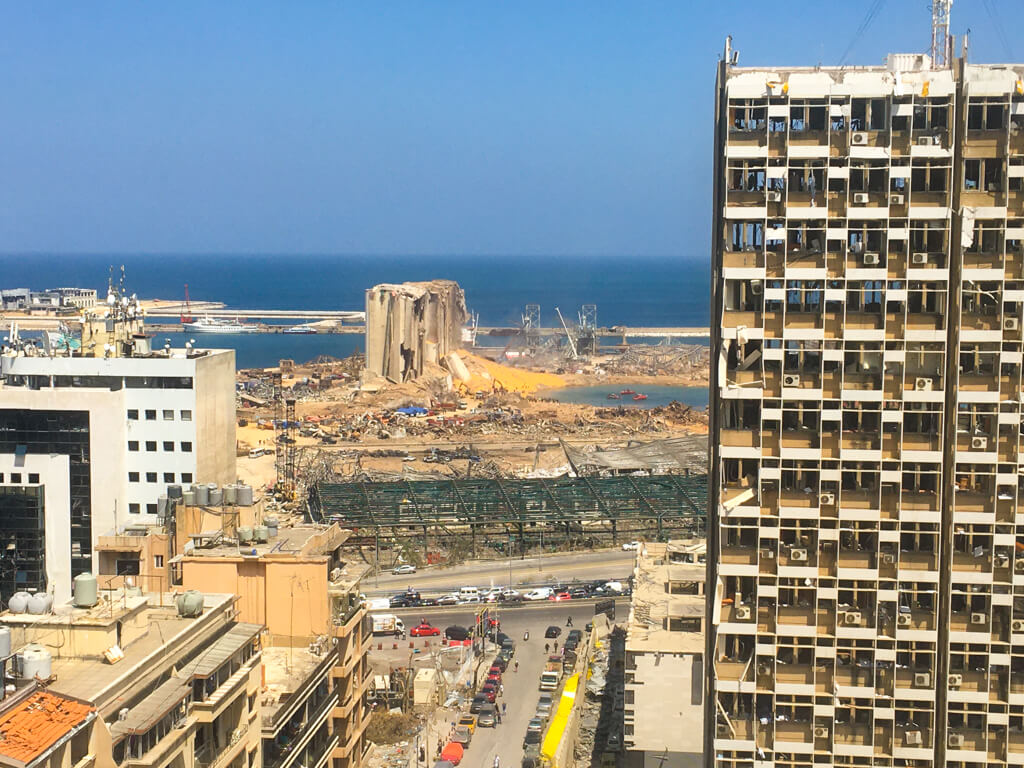
The view from Eddy’s mentor’s apartment over the port of Beirut. Notice the remains of the grain silos and the new bay that was formed from the crater left by the explosion. On the right is the shell of the EDL building without a single window remaining.
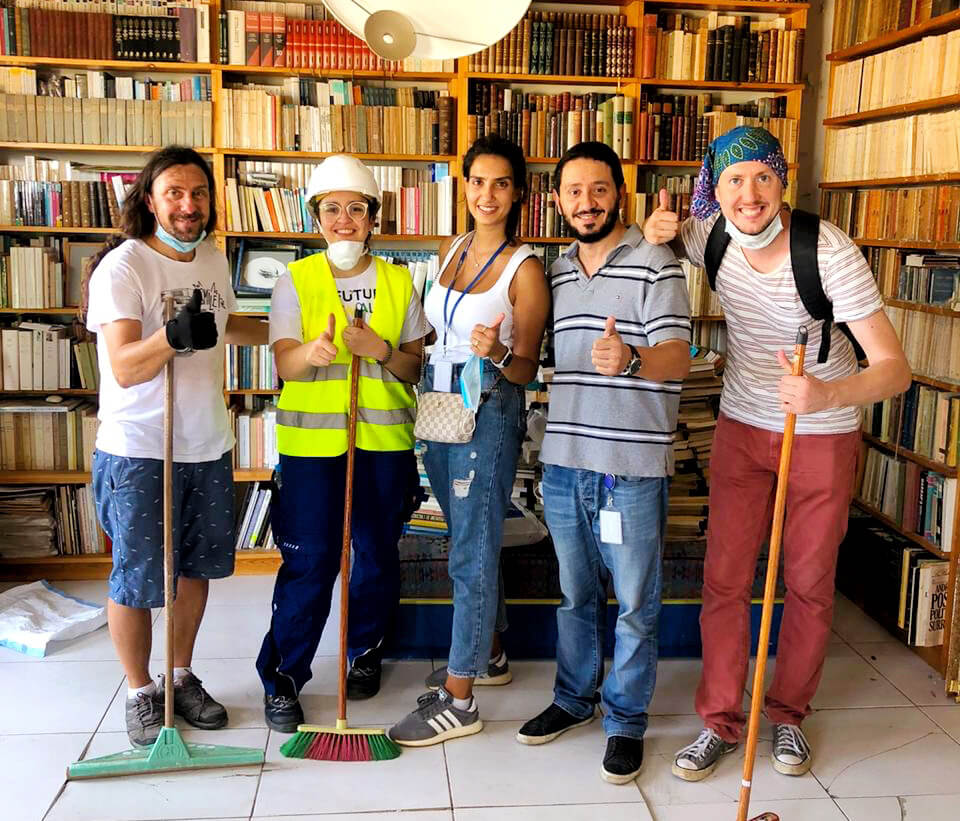
The clean up team, with Eddy on the left and me on the right.
On my walk home, I saw a couple of men whose car had evidently been hit by falling debris, which had left a large dent in the roof, trying to bash it back into shape from the inside. The sense of frustration in the air was palpable and, unsurprisingly, that night there were large anti-government demonstrations in Martyr’s Square in central Beirut. There had been political protests ever since I arrived in Beirut six months ago, but the explosion reinvigorated them. That evening, they quickly became violent due to people’s frustrations with their government’s perceived incompetence, lack of transparency and refusal to allow an independent investigation. The same occurred the following two evenings, with demonstrators even taking over government ministries, until at last the government resigned six days after the explosions.
It remains to be seen what happens next in Beirut. In my six months here, I have experienced political protests, a currency crisis, the corona virus, which is starting to spiral out of control, the largest explosion in the country’s history (even in 15 years of civil war and the Israeli bombings of Beirut in 2006) and now the resignation of the country’s government for the second time in a year. Many foreigners living in Beirut had left already before the explosion and more are now planning to leave. However, I still love Lebanon and the Lebanese people, so in the absence of any immediate threat, I will stay. Here’s hoping for everyone’s sake that the next six months are more peaceful than the last.
Donations
Thanks to everyone who donated to organisations assisting those impacted by the explosion. I’ve removed the list of links to reputable organisations previously included, as the emergency response is now over.
More about Lebanon
Thinking of visiting Lebaon? After two years living here, I’ve been to almost every inch of the country and written this Ultimate Lebanon Travel Guide with practical information and all the best places to visit. See the links below for my other articles on this crazy beautiful country:
Jezzine Travel Guide
Why Visit Jezzine? The picturesque village of Jezzine is perched high on a cliff top overlooking the incredible Jezzine waterfall - at 90m (295ft), one of the highest waterfalls in Lebanon. It’s also practically surrounded by Bkassine forest, the largest pine forest...
Ultimate Lebanon Travel Guide: How to Visit Lebanon and Stay Safe During the Crisis
Everything you need to know to enjoy travelling Lebanon during 2022, including the best itineraries, safety tips and amazing Lebanese food.

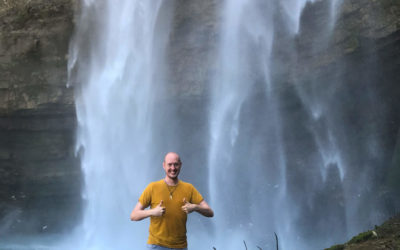
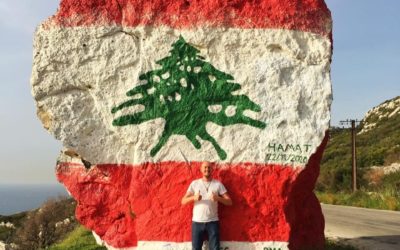
I cannot believe your life. I have to meet you! You are kind of like a young male version of me, but lots more adventurous than I. I am going to CS request that you host me in Lebanon just so maybe I can meet you. I’ll be coming on 3-4May from Egypt, but plan to be in Beirut a few days after my family visit. My daughter and her husband actually work in the South, Nabatiye 14 yrs, and my grandchildren. I will be there for 10 days and then have no plan but to meet you, if you are available. The other reason is I have to see my old area of Gemmayzah that was destroyed, my place I’ve stayed so many times, Saifi Gardens. I also will be meeting up with 3 other friends. I am going back to Africa after with no plan, I think! Wanda
Sent from Yahoo Mail on Android
Hi Wanda, it’s great to hear from you. I’ve replied to your message on Couchsurfing, so let’s talk there 🙂